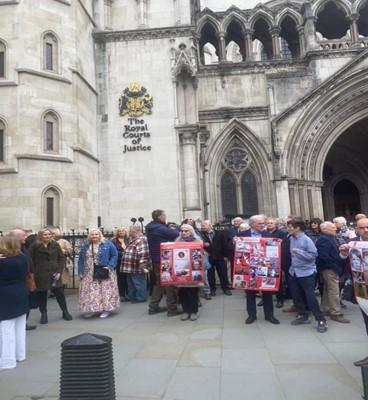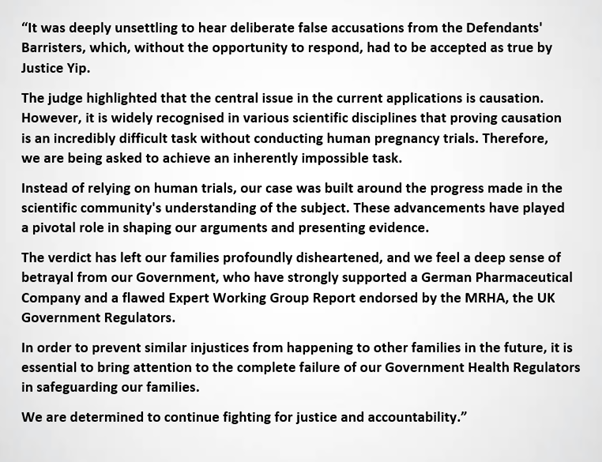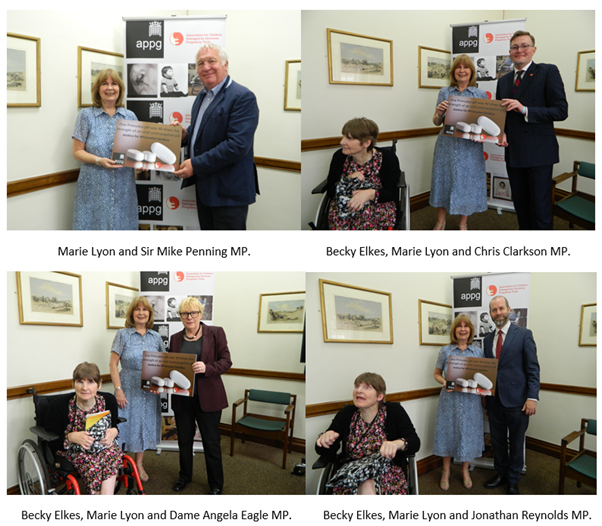Primodos 2023: Fighting Against the Odds - A Denied Opportunity for Justice

Photo kindly provided by Marie Lyon, Chairwoman of the Association for Children Damaged by Hormone Pregnancy Tests (ACDHPT).
In a highly anticipated legal battle that generated widespread media attention and significant public interest, the case involving over 100 Primodos affected claimants, represented by Charles Feeny, Jonathan Bertram, and Sam Irving (acting pro bono through Advocate), reached a pivotal juncture. The defendants in this high-stakes litigation were Bayer Pharma AG, Schering Healthcare Limited, Aventis Pharma Limited, and the Secretary of State for Health and Social Care. The proceedings unfolded in The Royal Courts of Justice, presided over by Mrs. Justice Yip, extending over four days from May 2nd to May 5th, 2023. Despite the hopes of the claimants, the outcome of this closely monitored hearing , did not favour them.
As outlined in the approved judgment, the defendants maintained that the claims should be struck out as an abuse of process, citing the following reasons:
- The claimants were attempting to re-litigate the same causation issue that had already been the subject of earlier failed litigation.
- No significant changes in scientific understanding would have supported the claimants' case.
- The scientific consensus had turned against the claimants.
- The claims were destined to fail, just like the previous ones.
- The claimants lacked funding, making their claims non-viable.
- The claimants lacked proper legal representation to progress with the litigation.
After weeks of anticipation, the judgment in the case was finally delivered by Mrs. Justice Yip on May 26th, 2023, at 10:30 am. The Approved Judgment ruled against the claimants and was released remotely. Initially, the judgment was circulated via email to the parties and their representatives. Subsequently, it was made available to the public through the National Archives.
Mrs. Justice Yip thoroughly considered the defendants' application to strike out the claims of the claimants, taking into account previous litigation that had failed to establish a causal link between hormone pregnancy tests (HPTs) and foetal harm. Following a comprehensive examination of the evidence, she determined that the position on causation had not "materially changed in the claimants' favour" since the previous litigation in 1982.
Consequently, burdening the defendants with additional costs to defend the action was deemed unjust. Moreover, the judge observed the absence of a viable plan to progress the claims, leading to minimal prospects of success. As a result, Mrs. Justice Yip concluded, "I am driven to the conclusion that the proceedings are an abuse of process and that the only appropriate response is to strike out the claims."
In the judgment, it was observed that the claimants' expert evidence relied on the testimonies of three distinguished experts, including Professor Maurice Zeegers, a highly respected authority in Complex Genetics and Epidemiology. Professor Zeegers emphasised the significant advancements in epidemiology since 1982, particularly the adoption of rigorous methodologies like "Evidence-based Medicine" and "Systematic Review." Systematic reviews, as a cornerstone of evidence-based medicine, offer a comprehensive and rigorous analysis of existing research. They play a significant role in guiding medical decision-making and policy development.
In particular, Professor Zeegers endorsed Professor Carl Heneghan’s peer-reviewed meta-analysis regarding the association between hormone pregnancy tests (HPTs) and malformations. As a clinical epidemiologist at the University of Oxford, Heneghan is widely recognised for his expertise in evaluating medical evidence and conducting systematic reviews. His work holds immense value in providing critical insights and shaping our understanding of various medical issues. However, despite Zeegers’ endorsement of Heneghan’s meta-analysis, the Committee for Medicinal Products for Human Use (CHMP) has raised concerns regarding the independence of Professor Heneghan's analysis and the overall quality of the studies used in the meta-analysis. The CHMP declared Professor Heneghan's conclusions as lacking ground-breaking insights and being considered unreliable. Thus, the claimants’ reliance on such evidence may have been somewhat undermined by the CHMP’s view of Heneghan’s meta-analysis.
In a recent publication, by Thomas Mallon, a Barrister with the Henderson Chambers, he referred to the Primodos litigation as a “modern example of the strike out jurisprudence for lack of viability previously set out in the Benzodiazepene litigation in the 1990s and the organophosphate litigation in the early 2000s.” He emphasises the significance of importance of meticulously organising group claims to avoid potential issues and challenges that could lead to the claims being dismissed as an abuse of process. According to Mallon, it is essential to present clear and precise claims early on and to vigorously challenge claims that are not properly formulated. For these reasons, the judgement made in The Royal Courts of Justice to strike out the claims in the Primodos case, aligns with established legal precedents.
The verdict of the judgment has caused profound disappointment and disillusionment among the claimants and their families. Reflecting on the strike out, in a statement issued on June 1st, 2023, Marie Lyon, Chairwoman of the Association for Children Damaged by Hormone Pregnancy Tests (ACDHPT) expressed frustration at the judgment, saying:

Amidst the aftermath of the judgment, Yasmin Qureshi MP, a steadfast champion for those impacted by the Primodos scandal, has continued to rally support for justice. As the chair of the All Party Parliamentary Group Hormone Pregnancy Tests (APPGHPT), Qureshi has been unwavering in her efforts to advocate for Primodos-affected parents and children since 2011. She expressed strong criticism of the judgment, labelling it as “disgraceful and unfair”. Qureshi highlighted the difficult situation faced by the claimants, noting, "The reality is that we've been outdone by a lack of funding for legal support against the might of Big Pharma & Government lawyers."
Despite the court's findings, MPs remain resolute in their support and advocacy for families impacted by the use of Primodos. As of June 28th, 2023, the 133 member-strong All-Party Parliamentary Group on Hormone Pregnancy Tests (APPGHPT), is one of the largest groups in Parliament, and remains committed to raising awareness and seeking justice for those impacted by this issue. MPs from various parties, including Sir Mike Penning (Conservative), Ed Davey (Liberal Democrat), Yvonne Fovargue (Labour), Lord Alton of Liverpool (Crossbench) are actively involved in advocating for the implementation of recommendations from the Independent Medicines and Medical Devices Safety Review. Their dedication to addressing the concerns surrounding hormone pregnancy tests is unwavering, as they continue to work tirelessly to protect the welfare and rights of affected families. Moreover, on July, 13th, Yasmin Qureshi hosted the All-Party Parliamentary Group on Hormone Pregnancy Tests (APPGHPT) MPs Drop-In session, during which MPs continued to pledge support and commitment, and to seek answers on behalf of those affected by Primodos and their families.

Photos kindly provided by Marie Lyon (Chairwoman of the Association for Children Damaged by Hormone Pregnancy Tests (ACDHPT).
In addition to parliamentary support, academics have also played a crucial role in continuing to raise awareness of the Primodos scandal. In a recent statement to The Guardian, Professor Carl Heneghan emphasised the existence of misconceptions about the use of epidemiological evidence in proving causation, which he believes should be addressed within a court of law. He stated, "It's unacceptable that those advocating for justice regarding the effects of hormone pregnancy tests on congenital malformations have not been allowed to have their case heard in court." Moreover, in a statement in the Mail Online, Professor Heneghan stated “Our analysis followed all the necessary steps expected of a high-quality scientific study”, adding “I challenge any health expert to look at this evidence and disagree.”
In the aftermath of the case, Professor Heneghan published a series of timely and comprehensive articles throughout June 2023. These articles, collectively known as "The Primodos Scandal" series (Part 1, Part 2, Part 3, Part 4 and Part 5), delved into the complexities of the Primodos scandal, providing in-depth analysis and insights on various aspects related to hormone pregnancy tests and their potential effects on congenital malformations.
In their arduous journey for justice, the Primodos-affected claimants and their families have encountered numerous challenges. They expressed immense gratitude for the unwavering support provided by Charles Feeny, Jonathan Bertram, and Sam Irving, who acted pro bono on their behalf through Advocate. The absence of legal representation and limited financial resources posed significant hurdles for the claimants. However, they were fortunate to receive ongoing support from Freeths, who provided expert evidence, and Liverpool JMU Law Clinic, who offered pro bono assistance. The dedication and generosity of these individuals were instrumental in ensuring that the claimants had some form of representation throughout the legal process.
The journey was made even more remarkable by the grit and determination of the Association for Children Damaged by Hormone Pregnancy Tests (ACDHPT) members, who tirelessly raised funds for the cause. The Association managed to raise an impressive total of £61,632.51, with additional gift aid yet to be finalised. These funds were generated through various avenues, including annual subscriptions, charitable fundraising events, and crowdfunding campaigns. Such concerted efforts were by no means an easy feat.
This judgment serves as a powerful reminder of the importance of providing adequate resources and support to those who seek justice. The claimants' profound gratitude for the assistance they received underscores the significant impact that pro bono support can have on individuals who may otherwise struggle to navigate the complexities of the legal system. It is imperative to address the financial barriers that hinder access to justice and ensure that everyone, regardless of their circumstances, has an equal opportunity to present their case, challenge misconceptions, and seek retribution for the harms they have endured. The outcome of this case serves as a call to action, urging society to come together and work towards a more equitable and just legal system that truly works for the needs of its citizens.
To find out more about the Association for Children Damaged by Hormone Pregnancy Tests (ACDHPT) campaign and keep up to date with news, visit primodos.org.
In addition, there are a number of ways you can support the campaign:
- Follow ACDHPT on Twitter
- Follow ACDHPT on Facebook
- Encourage your MP to join the APPG for hormone pregnancy tests.
- Make a donation to help ACDHPT continue their campaign
- Get in touch with Marie Lyon
If you are interested in reading more about this injustice, Sharon Hartles has published several articles on the Harm and Evidence Research Collaborative blog that may be of interest:
Primodos: Financial redress is long overdue
Primodos, Mesh and Sodium Valproate: Recommendations and the UK Government’s response
Primodos: The next steps towards Justice
Primodos: The first step towards Justice
Sharon Hartles, Member of the Harm and Evidence Research Collaborative, The Open University. Member of the British Society of Criminology. Affiliated with the Risky Hormones research project (an international collaboration in partnership with patient groups). Contact: sh28739@ou.ac.uk
